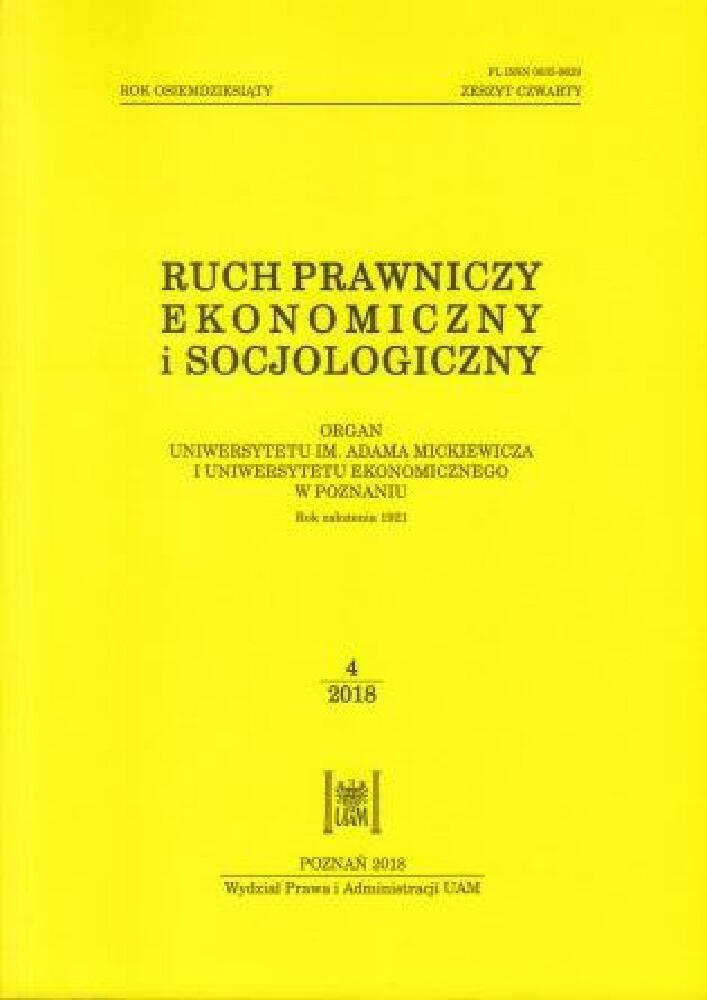Abstract
Among the whole set of legal norms, norms that are legal principles are of particular importance. The attribute that gives a legal norm the status of a principle of law is its importance for the legal system. An important division of legal principles introduces a distinction between the principles formulated directly in the legal text (explicit principles), the principles interpreted from the legal text, although not explicitly expressed in the legal text (implicit principles), and the principles of law not expressed in legislative acts but constituting an element of legal culture (second-degree implicit principles). The law on the protection of cultural heritage is now considered to be a comprehensive branch of law, and one of the basic criteria for separating a branch of law is the possession of own principles of law, a criterion which is satisfied in relation to the catalogue of principles presented in the article, with the guiding principle being the principle of cultural heritage protection interpreted under Articles 5 and 6 of the Constitution of the Republic of Poland. Among other principles of the law on the protection of cultural heritage the following can be distinguished in particular (with the reservation that the catalogue presented in the article has an open character): the principle of access to monuments, the principle of social utility of monuments, the principle of access to information, the principle of control over the state of preservation of monuments, the principle of integrity of the monument, the principle of sustainable development, the principle of cultural heritage management, the principle of change in the usable value of the cultural heritage over time, the principle of financing by the monument holder, the principle of financing from public resources, principles of property protection, the principle of proportionality, the state control over the trading in monuments and the principle of the control of exporting historic objects abroad.References
Alexy, R. (1985). Theorie der Grundrechte, Baden-Baden.
Brodecki, Z. (red.). (2007). Europa sędziów. Warszawa.
Drela, M. (2006). Własność zabytków. Warszawa.
Florczak-Wątor, M. (2016). Komentarz do art. 5, [w:] M. Safjan, L. Bosek (red.), Konstytucja RP. Tom 1: Komentarz. Art. 1–86. Warszawa.
Florczak-Wątor, M. (2016). Komentarz do art. 6, [w:] Konstytucja RP. Tom 1: Komentarz. Art. 1–86, red. M. Safjan, L. Bosek. Warszawa.
Kordela, M. (2012). Zasady prawa. Studium teoretycznoprawne. Poznań.
Korycka-Zirk, M. (2012). Teorie zasad prawa a zasada proporcjonalności. Warszawa.
Królikowski, M., Szczucki, K. (2016). Komentarz do art. 73, [w:] M. Safjan, L. Bosek (red.), Konstytucja RP. Tom 1: Komentarz. Art. 1–86. Warszawa.
Maroń, G. (2011). Zasady prawa. Pojmowanie i typologie a rola w wykładni prawa i orzecznictwie konstytucyjnym. Poznań.
Menkes, J. (1988). Zasady prawa międzynarodowego. Państwo i Prawo 10.
Morawski, L. (2001). Zasady wykładni prawa. Toruń.
Morawski, L. (2010). Zasady prawa – komentarz krytyczny, [w:] J. Stelmach, Studia z filozofii prawa. Kraków.
Morawski, L. (2014). Podstawy filozofii prawa. Toruń.
Pruszyński, J. (2001). Dziedzictwo kultury Polski. Jego straty i ochrona prawna. Tom 1. Kraków.
Pułło, A. (1996). Idee ogólne a zasady prawa konstytucyjnego. Państwo i Prawo 8.
Szafrański, W., Zalasińska, K. (red.). (2009). Wokół problematyki prawnej zabytków i dzieł sztuki. Tom 3: Prawna ochrona dziedzictwa kulturowego. Poznań.
Tkacz, S. (2014). O zintegrowanej koncepcji zasad prawa w polskim prawoznawstwie (Od dogmatyki do teorii prawa). Toruń.
Tuleja, P. (1997). Zasady konstytucyjne, [w:] P. Sarnecki (red.), Konstytucjonalizacja zasad i instytucji ustrojowych. Warszawa.
Wronkowska, S., Zieliński, M., Ziembiński, Z. (1974). Zasady prawa. Zagadnienia podstawowe. Warszawa.
Wronkowska, S., Ziembiński, Z. (2001). Zarys teorii prawa. Poznań.
Zalasińska, K., Bąkowski, T. (2009). Paradygmat zrównoważonego rozwoju w prawnej ochronie nieruchomości zabytkowych – próba adaptacji, [w:] W. Szafrański, K. Zalasińska (red.), Wokół problematyki prawnej zabytków i dzieł sztuki. Tom 3: Prawna ochrona dziedzictwa kulturowego. Poznań.
Zalasińska, K., Zeidler, K. (2015). Wykład prawa ochrony zabytków. Warszawa–Gdańsk.
Zeidler, K. (2007). Prawo ochrony dziedzictwa kultury. Warszawa.
Zeidler, K. (2009). Zabytek jako szczególny przedmiot obrotu handlowego. Gdańskie Studia Prawnicze 21.
Zeidler, K. (2011). Restytucja dóbr kultury ze stanowiska filozofii prawa. O trudnych przypadkach na granicy kultury i prawa. Warszawa.
Zeidler, K. (2014). Prawo ochrony dziedzictwa kultury jako nowa gałąź prawa, [w:] K. Zeidler (red.), Prawo ochrony zabytków. Warszawa–Gdańsk.
Zeidler, K. (2015). Przestrzenie badawcze prawa ochrony dziedzictwa kultury. Gdańskie Studia Prawnicze 33.
Zeidler, K. (red.). (2014). Prawo ochrony zabytków. Warszawa–Gdańsk.
License
Copyright (c) 2018 WPiA UAM

This work is licensed under a Creative Commons Attribution-NonCommercial-NoDerivatives 4.0 International License.





